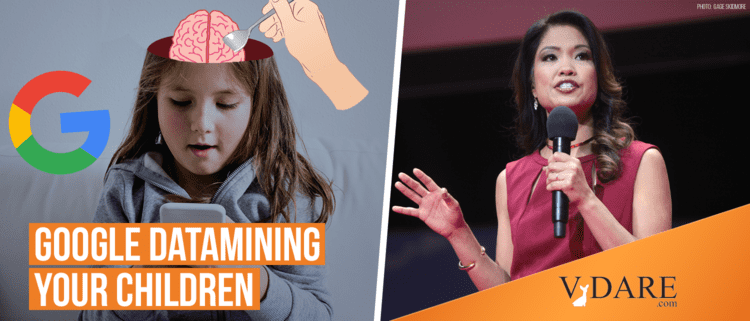
Michelle Malkin: What Will It Take to Stop Google’s Kiddie Predators?
02/04/2020
Earlier, by Michelle Malkin: Stop Google’s Kiddie Data Predators, The Student Data-Mining Scandal Under Our Noses, and How to Protect Your Kids From Google Predators and by James Kirkpatrick: The Rise Of Tech Totalitarianism: Michael Rectenwald’s GOOGLE ARCHIPELAGO
How much more evidence do we need to compile before the federal government protects our children and fully deplatforms Google from American public schools?
The Silicon Valley behemoth has already admitted it illegally collected children’s personal information on YouTube without parental consent, mines students' browsing habits and emails, and tracks kids' locations, audio and search history through Google educational apps and logons that are required for millions of students to participate in public schools.
Well, there’s more. Much more. Let us review the most recent alarming disclosures that expose grave public health and safety threats posed by the near-trillion-dollar company with its tentacles tightly wrapped around our kids' eyeballs, brains and behavioral data.
This week, the tech giant admitted for the first time that its data export service, Google Takeout, had accidentally sent the private information and videos of untold thousands of users to other strangers' accounts. The breach occurred in late November, but users only started receiving notices and apologies on Monday — nearly three months later.
"We are notifying people about a bug that may have affected users who used Google Takeout to export their Google Photos content between November 21 and November 25," an email sheepishly explained. "These users may have received either an incomplete archive, or videos — not photos — that were not theirs. We fixed the underlying issue and have conducted an in-depth analysis to help prevent this from ever happening again. We are very sorry this happened."
Can you imagine a similar breach of minors' photos and videos stored on students' Google Drives or Chromebooks or smartphones or home computers used to log on to mandatory learning management systems integrated with Google, such as Canvas or Schoology or Blackboard? It’s easy if you try.
Will "upsy-daisy" suffice when schoolkids' pictures, embedded with geolocation data, end up on a friendly neighborhood registered sex offender’s Google Photos album?
Two months ago, The Wall Street Journal reported that Google had secretly harvested "tens of millions of medical records" with identifying names, lab results, diagnoses, immunization records and prescriptions from thousands of hospitals across 21 states. "Project Nightingale" was a partnership with Ascension health system to build a search tool and data analytics using machine-learning algorithms. At least 150 Google employees had access to confidential patient data. Amazon, Microsoft and IBM have acquired private health data as well. It’s a massive Big Tech bonanza.
The implications for selling off children’s private health information are chilling. Like federal Health Insurance Portability and Accountability Act protections for patients, federal Family Educational Rights and Privacy Act protections have been sabotaged by "public-private partnerships" between government education officials and tech companies with insatiable appetites for data.
Will "trust us" cut it when Google gets access to your kids' school-based health records?

Meet "Gaggle." Fully integrated with Google Apps for Education and designated as a Google "Premier Partner," this snooping system is marketed to school districts as a "safety" mechanism for students. Through 24/7 monitoring of kids' online use, Gaggle "alerts school officials when students show signs of self-harm, depression, thoughts of suicide, substance abuse, cyberbullying, unhealthy relationships, and credible threats of violence against others."
Privacy experts for a pro-digital learning nonprofit called Common Sense determined that it is "unclear" whether Gaggle "allows users to control how their data are displayed," "whether this product allows parents to withdraw consent for the further collection of their child’s information" and "whether this product provides parental consent notice."
Despite all of that uncertainty, 1,400 school districts use Gaggle to mine "social media, browsing history, email, homework documents, uploads, chats, pictures, and calendars" — and put untold tens of thousands of students at risk of privacy breaches that could do damage for a lifetime.

Last spring, Google reported at an education conference that it had started making its cloud platform program accessible to K-12 school districts. Evergreen, Washington, public schools chief Derrick Brown (right) bragged about his district’s data-mining pilot program with Google. "We have tons of data in our school districts," he is quoted outlining in Education Week, citing information gathered through "student information systems, instructional software programs, online surveys of children’s social-emotional well-being, and special-needs students' individualized education plans."
"All that data needs to go in a container," Brown explained. And that container will be Google Cloud Platform. Now, imagine questionnaires and tests stored in the G-container measuring "social-emotional well-being" of children and their families according to politically correct ideology. Imagine being a parent who objects to mandatory vaccine laws or who holds "America first" views deemed "extremist" and "hateful" or who stores guns responsibly in your home — information that is not the business of a school district or Silicon Valley giant. Where’s the protection for such families? What’s the academic justification for gathering it?
Brown hasn’t bothered to figure out yet how parents will be able to maintain control over the data or contemplating privacy concerns. Why bother? It’s free!
What possible academic benefits could outweigh the real harm posed by school officials' addiction to "free" Google services? Understand this before it’s too late: When the educational products are "free," it’s our children who are the products — or the prey.
COPYRIGHT 2019 CREATORS.COM

